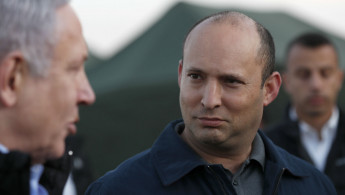Right-wing Israeli parties unite for third election
Religious-nationalist parties came together ahead of Israel's third election in one year, shutting out the fringe Jewish Power party.
3 min read
Defence Minister Naftali Bennett will head a right-wing alliance [AFP/Getty Images]
Three far-right religious-nationalist parties in Israel joined forces late Wednesday, seeking to strengthen their hand in a coming election after a left-leaning alliance was announced earlier in the week.
Israel is gearing up for its third election in less than a year after neither Prime Minister Benjamin Netanyahu nor his centrist challenger Benny Gantz were able to form a majority government following two polls last year.
Whoever is tasked with forming a government will need to win the support of small parties, which can wield major clout in coalition negotiations.
Under Israel's system of proportional representation, parties may form joint electoral lists to boost their chances of being selected as coalition partners.
On Tuesday, Defence Minister Naftali Bennett's New Right Party struck a deal with the National Union faction of Transport Minister Bezalel Smotrich.
On Wednesday night, just before the deadline for filing electoral lists, they were joined by the national religious Jewish Home party, led by Education Minister Rafi Peretz.
The trio will run under the name Yamina ("Rightward" in Hebrew).
|
Left out in the cold was fringe Jewish Power - the extreme-right party which many view as racist - despite Netanyahu's reported push for them to be included in Bennett's alliance.
Jewish Power has said it would run independently. It did so in the previous elections and did not garner enough votes to make it into the Knesset.
"I will not include on my electoral list someone who has in his living room at home a picture of a man who murdered 29 innocent people," Bennett wrote on Facebook Wednesday.
Video shot in Jewish Power leader Itamar Ben-Gvir's home in the flashpoint West Bank city of Hebron shows a photograph of Israeli settler Baruch Goldstein, who killed 29 Muslim worshippers with an assault rifle in 1994 before being beaten to death by survivors.
Ben Gvir, who lives in a Jewish settler enclave in the mainly Palestinian city, has been quoted as saying that the picture is there out of respect for Goldstein as a doctor he says saved Jewish lives.
Israeli media reported that Ben-Gvir had offered to take down the picture if Bennett allowed him into his alliance.
Jewish Power's top candidates for the Knesset are successors of the late rabbi Meir Kahane, who advocated the forced removal of Palestinians and a Jewish theocracy.
Kahane's Kach Party was banned from the Israeli parliament in the 1980s, and the US classified his Jewish Defence League as a terrorist group.
The bloc, whose constituents are hard-line religious Israelis, many of them West Bank settlers, has been riven by traditionalists who tend to follow the conservative policy directives of rabbis and a more liberal stream, led by Defense Minister Naftali Bennett.
Bennet has sought to broaden his party's appeal and will head the right-wing union going into the 2 March vote.
For the second vote in September, the religious-nationalist parties united under one banner, with the popular hard-line former justice minister, Ayelet Shaked leading the list.
Shaked has been commonly condemned for her extreme ultranationalist views that has led her to advocate genocide against Palestinians.
Prime Minister Benjamin Netanyahu had pressured Bennet to join forces with the fringe right-wing party, Haaretz reported.
Read more: What Prince Charles won't see when he visits Israel
On Monday, the left-wing Labor-Gesher and Meretz parties announced they were joining forces for the next election.
Israel's four Arab-led parties registered as running together, as they did in September, as the Joint List.
A total of 30 lists were submitted, the National Elections Committee said.
Follow us on Twitter and Instagram to stay connected





 Follow the Middle East's top stories in English at The New Arab on Google News
Follow the Middle East's top stories in English at The New Arab on Google News


